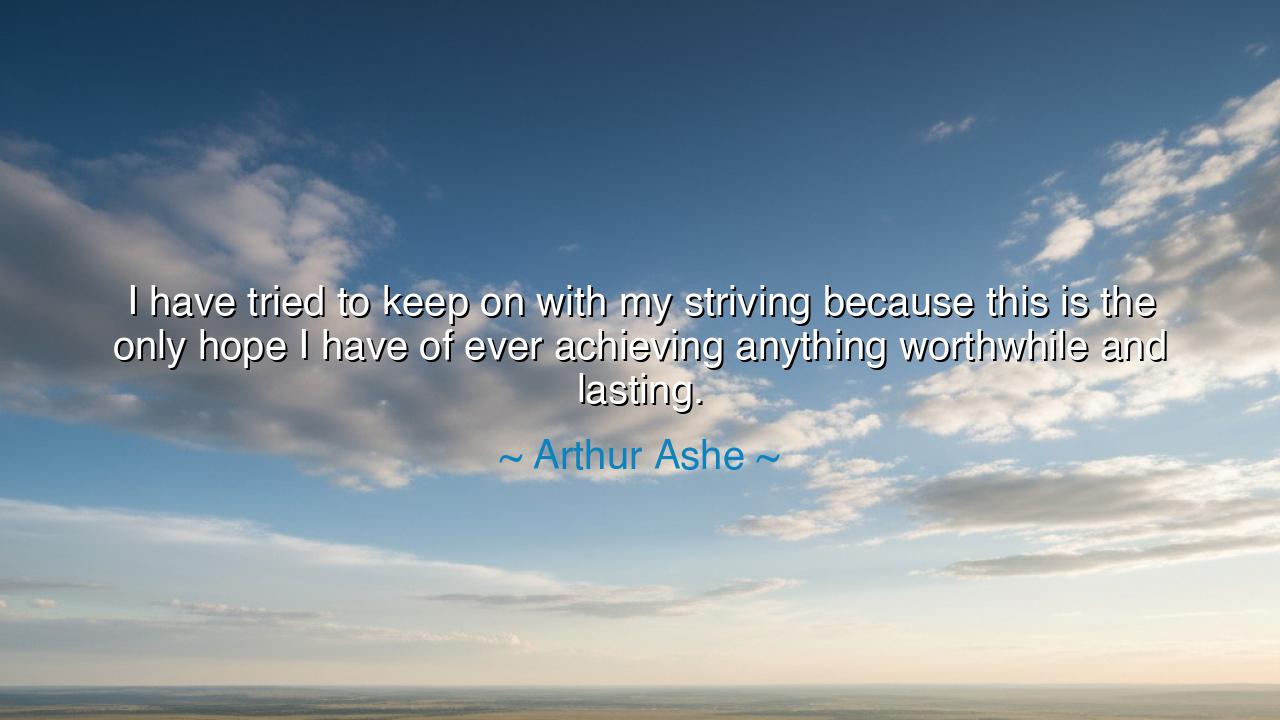
I have tried to keep on with my striving because this is the only
I have tried to keep on with my striving because this is the only hope I have of ever achieving anything worthwhile and lasting.






The words of Arthur Ashe — “I have tried to keep on with my striving because this is the only hope I have of ever achieving anything worthwhile and lasting” — are a hymn to endurance, humility, and purpose. In them speaks not merely an athlete, but a warrior of the soul, one who understands that greatness is never bestowed — it is earned through struggle. His confession is not of triumph, but of perseverance; not of glory, but of the relentless march toward meaning. For Ashe knew what the ancients knew: that to strive is to live, and to cease striving is to let the fire of the human spirit go out.
In ancient philosophy, striving was the breath of the noble life. The Stoics taught that a person’s worth was not in victory or wealth, but in the persistence of effort — the discipline to walk the hard path even when reward seems far away. So too does Ashe echo this truth: that our only true hope lies not in talent or fortune, but in the act of striving itself. His words remind us that every enduring achievement — whether in sport, in art, or in character — is born from the quiet, stubborn refusal to yield. It is the continuity of effort, not the moment of success, that makes something worthwhile and lasting.
Arthur Ashe’s own life was a living testament to these words. Born into a world that placed barriers before him because of the color of his skin, he became the first Black man to win the U.S. Open, Wimbledon, and the Australian Open. Yet his greatest victories were not on the tennis court. They were the triumphs of dignity over anger, discipline over despair, and principle over pride. Even when illness came — when he was struck by HIV through a blood transfusion — he continued to write, to teach, and to inspire. His striving did not end when his body weakened; it deepened. He proved that true striving is of the spirit, not the flesh.
The ancients would have called him a man of arete — of excellence born from virtue. His striving was not reckless ambition, but the noble pursuit of something “worthwhile and lasting” — something that would outlive the self. For what endures in this life is not the applause of the crowd, nor the trophies that gleam for a season; it is the character we forge, the lives we touch, the example we leave. In every age, there have been those who understood this: from Marcus Aurelius, who ruled an empire yet wrote only of humility, to Florence Nightingale, who labored through sickness to serve others. They too knew that striving is not a means to greatness — it is greatness.
There is a divine rhythm to Ashe’s words: a recognition that human life is woven of struggle, and that the act of striving itself is sacred. Each dawn offers the same question: Will you continue? And every time we rise, tired yet unbroken, we answer it. That is the hidden heroism of ordinary days. The craftsman shaping wood, the teacher lighting minds, the parent nurturing a child — all are engaged in the same eternal striving, the same quiet rebellion against decay and futility. To strive is to honor the gift of life itself.
Yet Ashe does not speak of blind ambition. His striving is guided by hope, the “only hope” he claims to have. This is not despair, but humble realism — the understanding that one cannot control destiny, but can command effort. Hope alone is fragile; effort alone is cold. But together, they form the engine of creation. The one gives meaning, the other gives movement. Through them, a person builds something that endures — not in monuments of stone, but in the unseen architecture of the human spirit.
So remember, child of the future: do not cease your striving. When you falter, strive again. When success feels distant, let effort be your anchor. Do not seek what is easy or fleeting, but what is worthwhile and lasting. For nothing of value grows without resistance — not the mountain peak, nor the soul that climbs it. Take your place among those who endure, and let your striving be your prayer, your weapon, and your hope. For as Arthur Ashe taught, striving is not merely the road to achievement — it is the only way to truly live.






AAdministratorAdministrator
Welcome, honored guests. Please leave a comment, we will respond soon